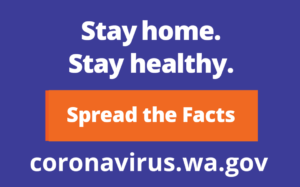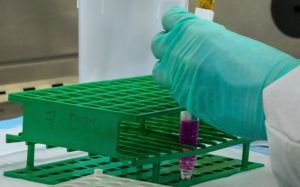Is the call or email about test kits, vaccines, cures, or stimulus checks real? NO!!
Criminals see opportunity where there is fear, lack of information, and money to be made and the COVID-19 pandemic is the perfect intersection of all three. It may be hard for us to keep this current but here are organizations and resources likely to be on top of this:
Washington State Office of the Attorney General
The Washington State Office of the Attorney General is a great first stop here in Washington State.
Scam Alerts
The WA Attorney General issues consumer alerts of scams and COVID-19 is the topic of multiple Consumer Alerts.
- Fake Charities: Sadly, some of these scams are fake charities. The AG warns: Check to see if the charity is registered with the Secretary of State at www.sos.wa.gov/charities/ to review its tax status and financial records. If the organization is not registered, or you would like further information, contact the Secretary of State’s Charities Program at 1-800-332-4483. Check the charity’s rating by Better Business Bureau at www.give.org. More resources for donors can be found at www.sos.wa.gov/charities/ResourcesforDonors.aspx.
- Phishing. Scammers are sending texts and emails promising to protect people from the virus, or offering cash payments to help weather the crisis. In reality, these messages are trying to obtain personal information, efforts known as phishing, or install harmful software on your device, called malware. Too good to be true? Likely a scam.
Filing a Complaint with the Washington AG’s Office
Related to price-gouging and products that claim to treat or cure COVID-19: “Scammers often prey on fear. As the COVID-19 outbreak and response continue, Washingtonians may see people advertising products or services they claim treat or cure the disease. There is no specific antiviral treatment recommended for COVID-19 at this time. Any claims that a product or service can cure, kill, or destroy COVID-19 are probably false, and should be reported to our office.” Information on filing a complaint is available here: https://www.atg.wa.gov/file-complaint .”
United States Department of Justice [Federal]
The Department of Justice advice is on their COVID-19 Fraud page is remaining vigilant in detecting, investigating, and prosecuting wrongdoing related to the crisis. From DoJ: “Be aware that criminals are attempting to exploit COVID-19 worldwide through a variety of scams. There have been reports of:
- Individuals and businesses selling fake cures for COVID-19 online and engaging in other forms of fraud.
- Phishing emails from entities posing as the World Health Organization or the Centers for Disease Control and Prevention.
- Malicious websites and apps that appear to share virus-related information to gain and lock access to your devices until payment is received.
- Seeking donations fraudulently for illegitimate or non-existent charitable organizations.
If you think you are a victim of a scam or attempted fraud involving COVID-19, you can report it without leaving your home though a number of platforms. Go to:
- Contact the National Center for Disaster Fraud Hotline at 866-720-5721 or via email at disaster@leo.gov
- Report it to the FBI at tips.fbi.gov
- If it’s a cyber scam, submit your complaint through https://www.ic3.gov/default.aspx
U.S. Federal Trade Commission [Federal]
- The U.S. Federal Trade Commission is another Federal agency tasked to uncover COVID-19 fraud. See their helpful page on tips on how to avoid scams at Coronavirus Scams – What the FTC is Doing. They even post real recordings on that page of “Scammy Calls About the Corona Virus.” Great recordings to play if you know someone prone to these calls!
AARP, American Association of Retired Persons
- AARP provides information and resources on fraud for retirees and seniors as they are frequent targets of phone fraud and cybercrime. In their recent article 6 Scams to Dodge in 2020, COVID-19 scams make the list.
Malwarebytes.com [For-profit Company]
- Malwarebytes.com has posted a great blog “Coronavirus scams, found and explained” that explains and shows real examples of COVID19 scams.



